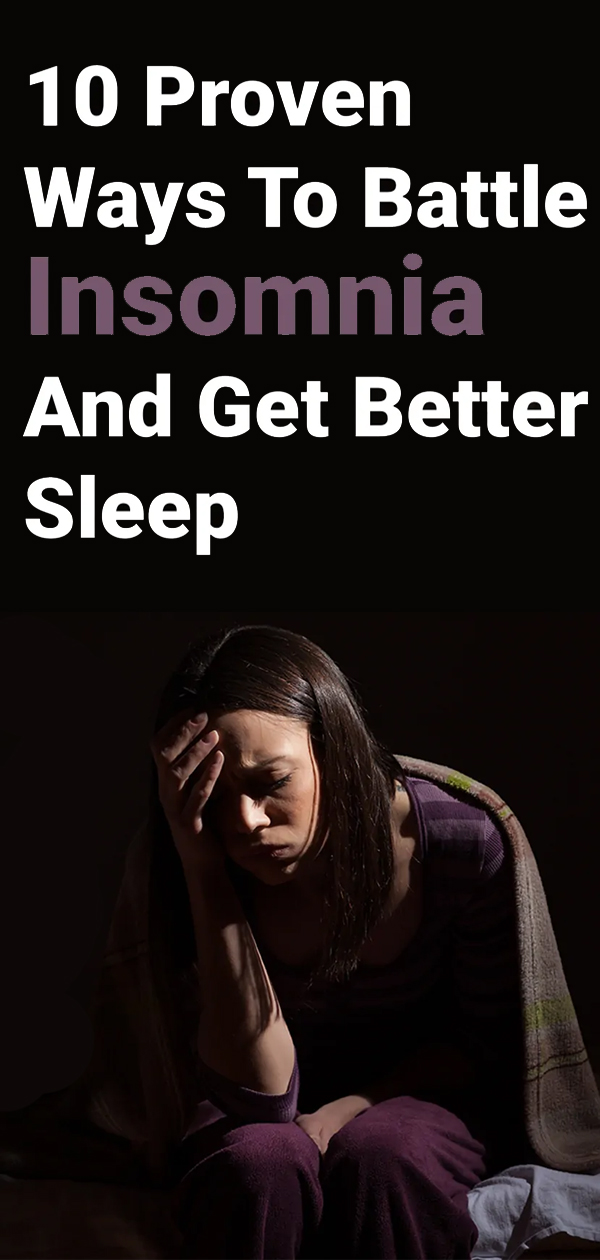At least 70 million adults in the U.S. suffer from a form of sleep disorder and 30 percent experience insomnia or difficulty in falling asleep. Because of this, sleep deprivation has become a common health problem among adults, with some turning to medication to overcome insomnia. But this sleep disorder can be managed naturally. There are some proven ways to battle insomnia and get better sleep.
Here Are 10 Proven Ways To Battle Insomnia And Get Better Sleep
“Insomnia is a gross feeder. It will nourish itself on any kind of thinking, including thinking about not thinking.” – Clifton Fadiman
1. Set A Bedtime Routine.
Going to bed and waking up at the same time daily, even on the weekends, can train your body and brain to get efficient sleep. According to Sleep.Org, your body needs this consistency and regularity to keep the rhythm of your internal clock in check. If you follow a bedtime routine, you will be able to fall asleep faster at night and wake up easier in the morning.
2. Curb Your Nap Times.
When you nap longer during the day, your brain waves trigger a deep sleep state that will make it harder for you to go to bed at night. Napping the wrong way may actually make your body more tired and groggy. Ideally, naps should be about 20 to 30 minutes long. It’s enough to boost your alertness and energy for the rest of the day, according to the Sleep Foundation.
3. Cut Caffeine Or Alcohol Intake.
Drinking coffee, especially a few hours before your bedtime, can affect how you sleep in a big way. Alcohol, on the other hand, might help you get to sleep but you won’t get a good rest, as it can trigger frequent awakenings and sleep interruptions. Some maintenance medications might have the same effects as caffeine and alcohol when it comes to sleep, so ask your doctor for other alternatives if this is the case.
4. Drink Cherry Juice Instead.
Cherry juice contains high amounts of melatonin, which helps in regulating the body’s sleep cycle. A small study in the American Journal of Therapeutics showed that participants aged 50 and above, who drank cherry juice twice a day for two weeks, significantly lessened their insomnia episodes. While further studies have yet to be undertaken to fully conclude cherry juice as an insomnia cure, the initial results of the pilot study showed promise.
5. Use The Bed For Sleeping Or Intimacy And Nothing More.
Make your bed a sanctuary for sleeping and getting intimate with your loved one. Don’t make your bed your work area, play area, or lounging area while watching movies on Netflix. Train your brain to associate your bed with two specific activities only: sleeping and cuddling. Otherwise, if you do other things in bed, your mind will constantly be on the alert and you’ll have a harder time falling asleep when it’s your actual bedtime.
6. Maintain Regular Exercises.
Experts have long professed that doing physical activities regularly can aid in higher sleep quality because exercises can regulate the body’s circadian rhythms or body clock. Participants in a study on theJournal of Sleep Research managed their insomnia, depression, and anxiety better following six months of regular, 150-minute-per-week exercises. For better results, experts suggest doing a workout on or before 7 a.m. rather than later in the day. Strenuous activities increase the body temperature for at least five to six hours, so you won’t feel sleepy until then.
7. Adjust The Temperature In Your Bedroom.
Ideally, your bedroom’s temperature should be around 60 to 65 degrees Fahrenheit to make it more conducive for sleeping. A warm bedroom would be very uncomfortable but it won’t also help if you make the bedroom too cold. Your body can’t fully relax if the temperature of the room is freezing. Instead, it will have to double up on its job to protect you from getting sick.
8. Turn Off The Lights When You Sleep.
Aside from saving energy, turning off the lights when you sleep will help your brain adjust for rest. Bright lights will keep you awake, which is why experts also advise against using electronics when you’re lying in bed and preparing to go to bed. The light from your gadgets will distract your brain when it should be resting already.
9. Don’t Pressure Yourself To Sleep.
If you’ve been trying to catch a wink for 20 minutes and nothing is happening, it’s best to get out of the bedroom and do something quiet and relaxing. You can read a good book, color, or knit in another room. You might also want to meditate and channel positive energy, as well as facilitate positive thinking.
The more you force yourself to sleep by tossing and turning in bed, the more you will feel anxious. However, if you do leave the room to find something else to do, make sure it’s not work-related. You will only spark and stimulate your brain if you read reports, emails, and data.
10. Aim For Continuous Sleep.
Make sure that your sleep hours are continuous, solid, and uninterrupted. Five hours of undisturbed sleep is healthier than eight to 10 hours of a fragmented sleep cycle. You’ll wake up feeling more rested in the morning when you sleep straight hours and your body clock will be more regulated as well.
Final Thoughts
Insomnia poses many risks that can affect not just your health but also your moods, concentration, and your ability to function. If these tips still do not help, you might need to discuss your sleep problems with a doctor to get a proper diagnosis and treatment.


